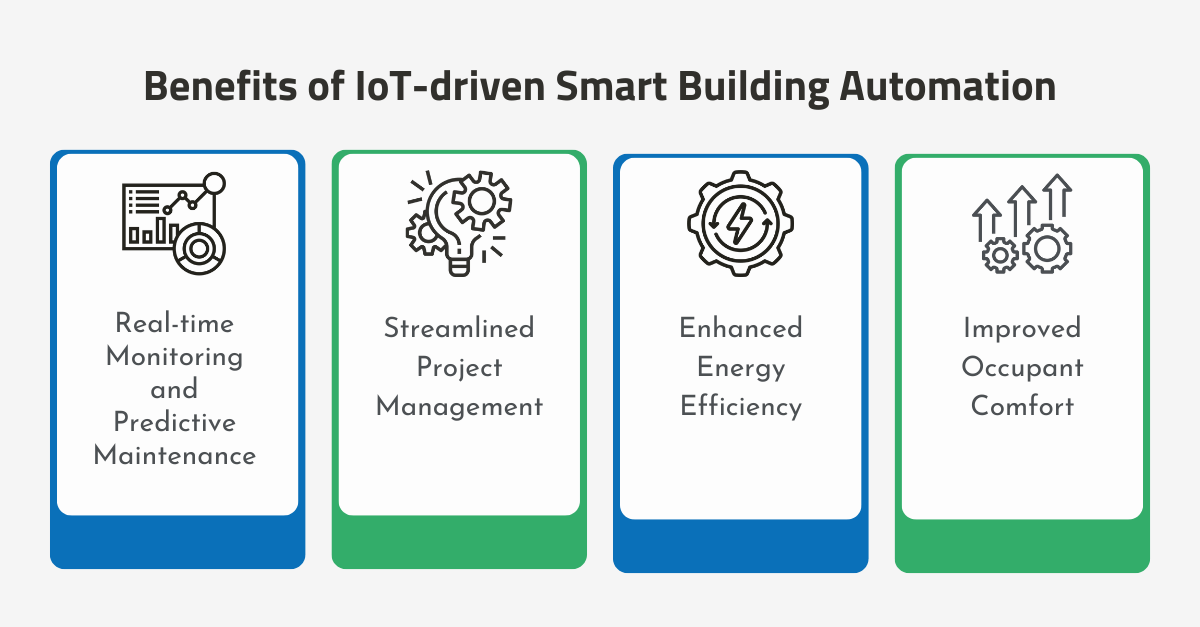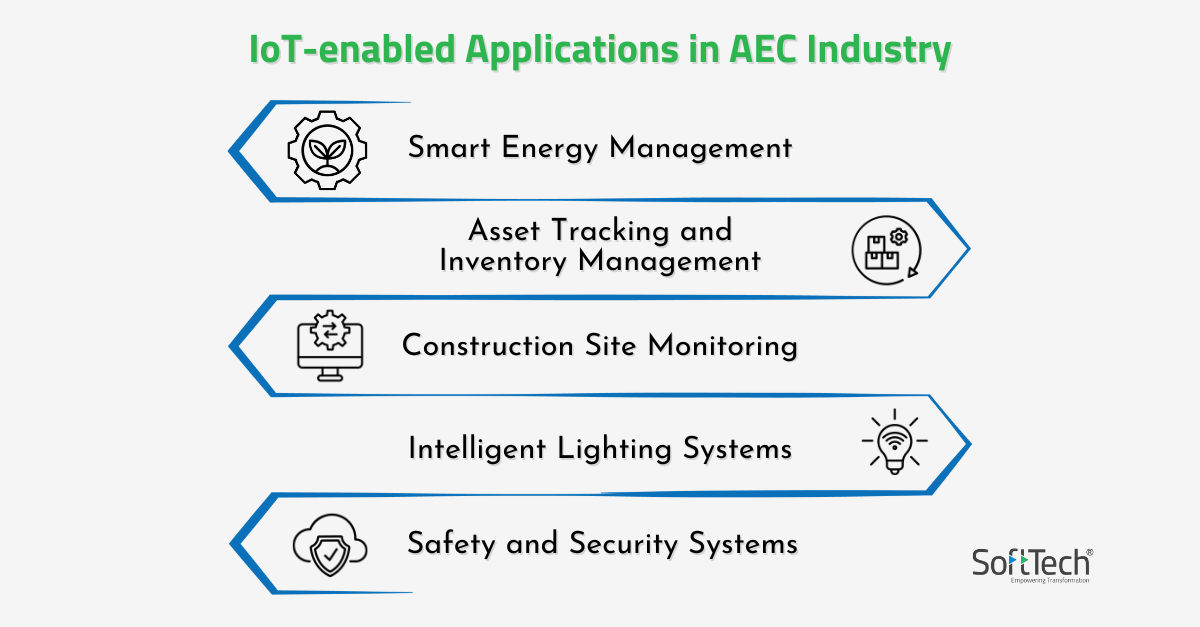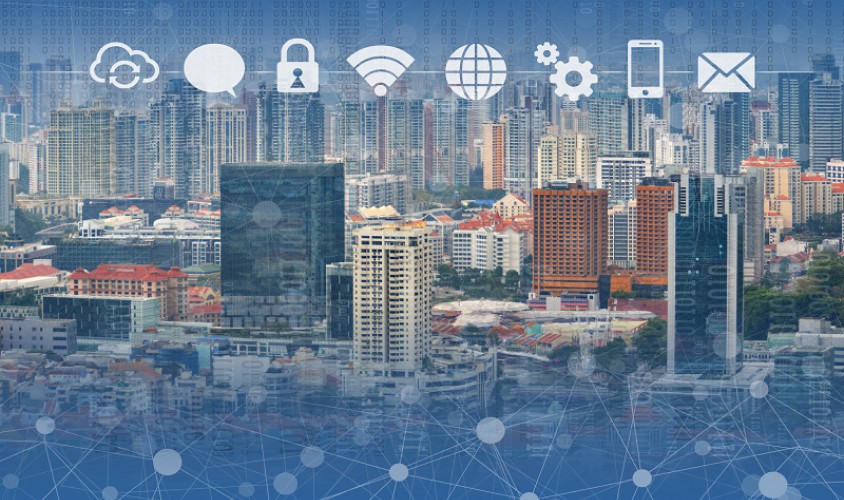Abstract
This white paper delves into the transformative potential of smart building automation in the construction industry through the integration of Internet of Things (IoT) technologies. It explores the benefits, challenges, and future prospects of IoT-driven solutions, highlighting their role in enhancing efficiency, sustainability, occupant comfort, and overall project management. By leveraging real-time data, analytics, and intelligent automation, construction companies can revolutionize their operations, optimize resource utilization, and deliver smarter, more connected buildings.
Introduction
The construction industry is embracing digital transformation, and IoT-driven solutions are at the forefront of this revolution. Smart building automation combines IoT devices, sensors, and data analytics to create intelligent, connected environments. This white paper explores how these technologies are transforming the construction industry, driving efficiency, sustainability, and improved project management.
Benefits of IoT-driven Smart Building Automation
IoT-driven smart building automation offers a multitude of benefits for the construction industry. Firstly, it enhances energy efficiency by leveraging IoT-enabled sensors and actuators to monitor and optimize energy consumption in heating, ventilation, and lighting systems. This not only reduces operational costs but also promotes sustainability by minimizing the environmental impact of buildings. Secondly, smart building automation improves occupant comfort by providing personalized environmental controls. IoT devices adjust temperature, air quality, and lighting conditions based on individual preferences, creating a more comfortable and productive environment.
Furthermore, real-time monitoring and predictive maintenance enabled by IoT devices help prevent equipment failures and reduce downtime, ultimately extending the lifespan of assets and reducing maintenance costs. Lastly, IoT-driven solutions streamline project management by providing real-time data on construction progress, resource allocation, and worker safety. This allows for informed decision-making, efficient workflows, and improved overall project outcomes. The benefits of IoT-driven smart building automation in the construction industry extend beyond energy efficiency and cost savings, positively impacting occupants, sustainability, and project management processes.
- Real-time Monitoring and Predictive Maintenance: IoT devices collect data on equipment performance, allowing for proactive maintenance, reducing downtime, and extending asset lifecycles.
- Streamlined Project Management: IoT-driven solutions provide real-time data on construction progress, resource allocation, and worker safety, enabling informed decision-making and streamlined workflows.
- Enhanced Energy Efficiency: IoT-enabled sensors and actuators monitor energy consumption, optimizing heating, ventilation, and lighting systems for maximum efficiency.
- Improved Occupant Comfort: Smart building automation enables personalized environmental controls, ensuring optimal temperature, air quality, and lighting conditions.

Challenges and Considerations
Implementing IoT technologies in the construction industry presents a unique set of challenges and considerations. Firstly, data security and privacy become paramount as IoT devices generate a vast amount of sensitive data that needs to be protected from unauthorized access and cyber threats. Robust security protocols and encryption methods are essential to safeguarding this information. Secondly, interoperability and standardization pose challenges due to the diverse range of IoT devices and systems used in construction.
Ensuring seamless communication and compatibility between different devices and platforms requires industry-wide collaboration and the establishment of common standards. Additionally, scalability and infrastructure requirements must be addressed, as large-scale implementation of IoT solutions demands reliable connectivity, sufficient bandwidth, and adaptable infrastructure to support the increased data flow. Overcoming these challenges requires a comprehensive approach that emphasizes collaboration, standardization, and investment in secure and scalable infrastructure. By addressing these considerations, the construction industry can unlock the full potential of IoT technologies and realize the benefits of improved efficiency, safety, and sustainability in construction projects.
- Data Security and Privacy: IoT devices generate vast amounts of data, necessitating robust security protocols to safeguard sensitive information.
- Interoperability and Standardization: The integration of diverse IoT devices and systems requires standardization efforts to ensure seamless communication and compatibility.
- Scalability and Infrastructure Requirements: Implementing IoT solutions at scale demands reliable connectivity, sufficient bandwidth, and adaptable infrastructure.
IoT-enabled Applications in Construction Industry
The integration of IoT technologies in the construction industry has paved the way for various applications that drive efficiency and enhance project outcomes. One prominent application is smart energy management, where IoT-driven solutions optimize energy consumption, monitor renewable energy generation, and facilitate demand response strategies. Intelligent lighting systems are another key application, as automated lighting control adjusts illumination based on occupancy, daylight levels, and energy-saving algorithms. Safety and security systems benefit from IoT sensors and cameras, enhancing site security, detecting hazardous conditions, and providing real-time alerts for proactive risk mitigation.
Additionally, IoT-enabled asset tracking and inventory management streamline operations, reducing material loss and optimizing resource allocation. Construction site monitoring is yet another valuable application, utilizing real-time data on construction activities, worker presence, and equipment usage to improve productivity, safety, and project oversight. These IoT applications in the construction industry contribute to enhanced efficiency, safety, and resource management, ultimately driving the industry towards a more connected and intelligent future.
- Smart Energy Management: IoT-driven solutions optimize energy consumption, monitor renewable energy generation, and facilitate demand response strategies.
- Asset Tracking and Inventory Management: IoT-based tracking systems streamline inventory management, reducing material loss and optimizing resource allocation.
- Construction Site Monitoring: Real-time monitoring of construction activities, worker presence, and equipment usage improves productivity, safety, and project oversight.
- Intelligent Lighting Systems: Automated lighting control systems adjust illumination based on occupancy, daylight levels, and energy-saving algorithms.
- Safety and Security Systems: IoT sensors and cameras enhance site security, detect hazardous conditions, and provide real-time alerts for proactive risk mitigation.

Future Prospects and Trends
Integration with Building Information Modeling (BIM): Combining IoT-driven automation with BIM technologies enhances project coordination, clash detection, and facility management.
Edge Computing and AI: Edge computing enables real-time data processing, while AI algorithms improve system intelligence, enabling predictive analytics and automated decision-making.
Digital Twins and Simulation: Virtual replicas of buildings enable testing and optimization of IoT systems before physical implementation, improving efficiency and reducing risks.
Conclusion
The construction industry stands to benefit immensely from the adoption of IoT-driven smart building automation. By leveraging real-time data, intelligent automation, and analytics, construction companies can optimize energy consumption, improve occupant comfort, enhance safety, streamline project management, and achieve sustainable and future-proof buildings. While challenges remain, continued innovation and collaboration will pave the way for a connected and intelligent construction industry.
About Author
Mr. Vijay Gupta
CEO & Founder at SoftTech
Mr. Vijay Gupta, an IIT Mumbai alumnus, is the Founder, Chairman and Managing Director of SoftTech Engineers Limited. He holds an M. Tech degree from IIT Mumbai. Vijay strongly believes that technology has to be leveraged extensively to bring in speed, efficiency and transparency in the AEC (Architecture, Engineering & Construction) industry for private as well as public sector organizations. He has a rich experience of about 30 years in the development of cutting-edge BIM/ CAD/ CAE /Project Management Enterprise Software in the AEC domain.
About SoftTech Engineers
A leading IT company (www.softtech-engr.com) facilitating business and technology transformation across the AEC industry through innovative software products and solutions. Equipped with 25+ years of deep domain expertise and industry knowledge, SoftTech has helped more than 4500 clients & government organizations, with more than 25000 users in India and around the world to gain a competitive edge and lead from the front in the industry.

